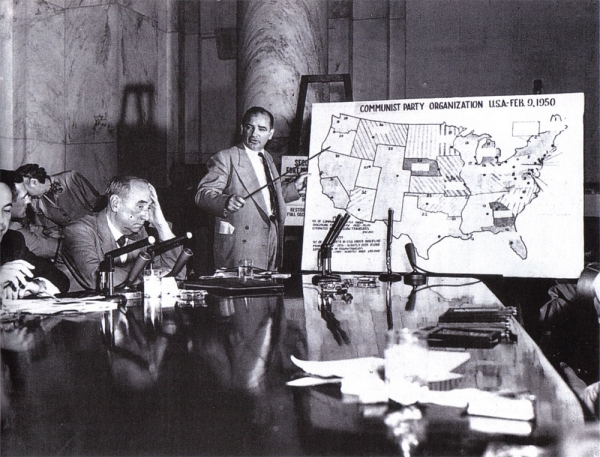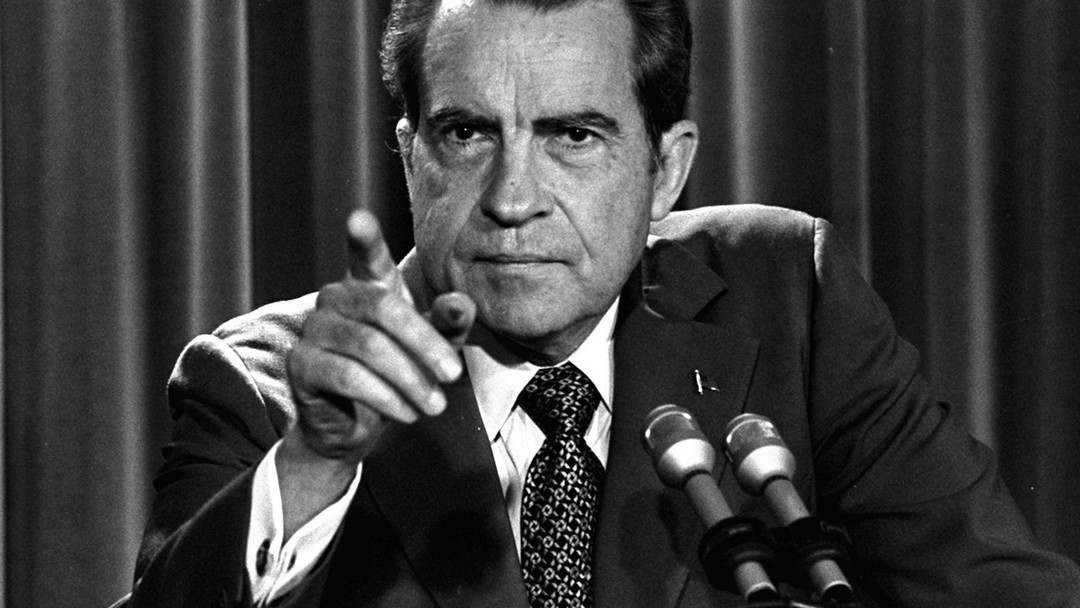
Boggs Act of 1952
The Boggs Act of 1952 amended the Narcotic Drugs Import and Export Act and set mandatory sentences for drug convictions. A first offense conviction for marijuana possession carried a minimum sentence of 2 to 10 years and a fine of up to $20,000.
H.R. 3490 (82nd): An Act to amend the penalty provisions applicable to persons convicted of violating certain narcotic laws, and for other purposes
Sponsor and status
- Introduced 82nd Congress (1951–1952)
- Status Enacted on Nov 2, 1951
- LawPub.L. 82-255
- Read Text » Last Updated: Nov 2, 1951
- Source GPO GovInfo – United States Statutes at Large
- Law Number Public Law 82-255
- Date Approved November 2, 1951
- Full Title An Act to amend the penalty provisions applicable to persons convicted of violating certain narcotic laws, and for other purposes
- Associated Bill Number H.R.3490
You are reading a bill enacted long ago. In the intervening time subsequent legislation may have amended or repealed the provisions below.
65 STAT. PUBLIC LAW 255—NOV. 2, 1951 767
guilty of a felony and, upon conviction, shall be fined not more than
$1,000 or imprisoned for not more than one year, or both: Provided
further, That the above penalty clause shall be in addition to, and not
in substitution for, any other provisions of existing law.
SEC. 802. Any funds provided by this Act shall not be available Domestic informa-
tion functions.
for the compensation of persons performing domestic information
functions or related supporting functions in excess of 50 per centum
of the amount provided herein.
SEC. 803. This Act may be cited as the "Second Supplemental Short title.
Appropriation Act, 1952".
Approved November 1, 1951.
Public Law 255 CHAPTER 6 6 6
AN ACT
November 2,1951
To amend the penalty provisions applicable to persons convicted of violating [H. K. 3490]
certain narcotic laws, and for other purposes.
Be it enacted hy the Senate and House of Representatives of the
Narcotic law viola-
United States of America in Congress assembled, That section 2 (c) tions, penalties.
of the Narcotic Drugs Import and Export Act, as amended (U. S. C , 42 Stat. 596.
title 21, sec. 174), is amended to read as follows:
"(c) Whoever fraudulently or knowingly imports or brings any
narcotic drug into the United States or any territory under its control
or jurisdiction, contrary to law, or receives, conceals, buys, sells, or in
any manner facilitates the transportation, concealment, or sale of any
such narcotic drug after being imported or brought in, knowing the
same to have been imported contrary to law, or conspires to commit
any of such acts in violation of the laws of the United States, shall be
fined not more than $2,000 and imprisoned not less than two or more
than five years. For a second offense, the offender shall be fined not
more than $2,000 and imprisoned not less than five or more than ten
years. For a third or subsequent offense, the offender shall be fined
not more than $2,000 and imprisoned not less than ten or more than
twenty years. Upon conviction for a second or subsequent offense, the
imposition or execution of sentence shall not be suspended and proba-
tion shall not be granted. For the purpose of this subdivision, an
offender shall be considered a second or subsequent offender, as the
case may be, if he previously has been convicted of any offense the
penalty for which is provided in this subdivision or in section 2557
(b) (1) of the Internal Revenue Code, or if he previously has been Post, p. 768.
convicted of any offense the penalty for which was provided in sec-
tion 9, chapter 1, of the Act of December 17, 1914 (38 Stat. 789), as
amended; section 1, chapter 202 of the Act of May 26, 1922 (42 Stat.
596), as amended; section 12, chapter 553, of the Act of August 2, 21 U. 8. C. §§ 171,
1937 (50 Stat. 556), as amended; or sections 2557 (b) (1) or 2596 of 173,174-177.
the Internal Revenue Code enacted February 10, 1939 (ch. 2, 53 Stat.
274, 282), as amended. After conviction, but prior to pronounce- Post, p. 768.
ment of sentence, the court shall be advised by the United States
attorney whether the conviction is the offender's first or a subsequent
offense. If it is not a first offense, the United States attorney shall
file an information setting forth the prior convictions. The offender
shall have the opportunity in open court to aiRrm or deny that he is
identical with the person previously convicted. If he denies the
identity, sentence shall be postponed for such time as to permit a trial
before a jury on the sole issue of the offender's identity with the person
previously convicted. If the offender is found by the jury to be the
76100 O - 52 (PT. I) - 51
768 PUBLIC LAW 255—NOV. 2, 1951 [65 STAT.
person previously convicted, or if he acknowledges that he is such
person, he shall be sentenced as prescribed in this subdivision.
"Whenever on trial for a violation of this subdivision the defendant
is shown to have or to have had possession of the narcotic drug, such
possession shall be deemed sufficient evidence to authorize conviction
unless the defendant explains the possession to the satisfaction of the
jury."
S?T*^i-^^^o«7 SEC. 2. Section 2557 (b) (1) of the Internal Revenue Code is
amended to read as follows:
"(1) Whoever commits an offense or conspires to commit an
offense described in this subchapter, subchapter C of this chapter,
53 Stat 269. ^^ ^^^ Qj. parts V or V I of subchapter A of chapter 27, for which no
2565, 259(>-2«»4, 3220- specific penalty is otherwise provided, shall be fined not more than
3239
'*"" $2,000 and imprisoned not less than two or more than five years.
F o r a second offense, the offender shall be fined not more than
$2,000 and imprisoned not less than five or more than ten years.
For a third or subsequent offense, the offender shall be fined not
more than $2,000 and imprisoned not less than ten or more than
twenty years. Upon conviction for a second or subsequent
offense, the imposition or execution of sentence shall not be sus-
pended and probation shall not be granted. F o r the purpose of
this paragraph, an offender shall be considered a second or subse-
quent offender, as the case may be, if he previously has been con-
victed of any offense the penalty for which is provided in this
Ante,p.7&?. paragraph or in section 2 (c) of the Narcotic Drugs Import and
Export Act, as amended (U. S. C , title 21, sec. 174), or if he
previously has been convicted of any offense the penalty for which
was provided in section 9, chapter 1, of the Act oi December
17,1914 (38 Stat. 789), as amended; section 1, chapter 202, of the
Act of May 26,1922 (42 Stat. 596), as amended; section 12, Chap-
ter 553, of the Act of August 2, 1937 (50 Stat. 556), as amended;
^«^«- o r sections 2557 ( b ) ( 1 ) o r 2596 of t h e I n t e r n a l R e v e n u e C o d e
enacted F e b r u a r y 10, 1939 (ch. 2, 53 S t a t . 274, 2 8 2 ) , as a m e n d e d .
After conviction, but prior to pronouncement of sentence, the
court shall be advised by the United States a t t o r n ^ whether the
conviction is the offender's first or a subsequent offense. If it is
not a first offense, the United States attorney shall file an infor-
mation setting forth the prior convictions. The offender shall
have the opportunity in open court to affirm or deny that he is
identical with the person previously convicted. If he denies the
identity, sentence snail be postponed for such time as to permit a
trial before a jury on the sole issue of the offender's identity with
the person previously convicted. If the offender is found by the
jury to be the person previously convicted, or if he acknowledges
that he is such person, he shall be sentenced as prescribed in this
paragraph."
26u.*s.^^§2596. ^^^- ^' Sectiou 2596 of the Internal Revenue Code is amended to
read as follows:
"SEC. 2596. P E N A L T I E S .
"For penalties for violating or failing to comply with any of the
provisions of this subchapter, see section 2557 (b) ( 1 ) . "
53 Stat. 387. gEC. 4. Section 3235 of t h e I n t e r n a l R e v e n u e Code is a m e n d e d t o
read as follows:
"SEC. 3235. P E N A L T I E S .
"For penalties for violating or failing to comply with any of the
provisions of this part, see section 2557 (b) ( 1 ) . "
66 STAT.] PUBLIC LAW 255—NOV. 2, 1951 769
SEO. 6. There are hereby repealed— Repeals.
(1) section 2 (f) of the Narcotic Drugs Import and Export 42stat. 597.
Act, as amended (IJ. S. C , title 21, sec. 174);
(2) the Act of August 12,1937, as amended (U. S. C , title 21, «> stat. 627.
sees. 200-200 ( b ) ) ;
(3) sections 2557 (b) (6), (6), and (7) of the Internal Reve-
miP C o d e ^ stat. 275.
liue v/oue. _ ^ _ 26 u. s. c. § 2557.
SEC. 6. Any rights or liabilities now existing under the laws or parts
thereof repealed by this Act shall not be affected by such repeal.
Approved November 2, 1951.
Boggs Act 1951 PDF
More Detailed Information

